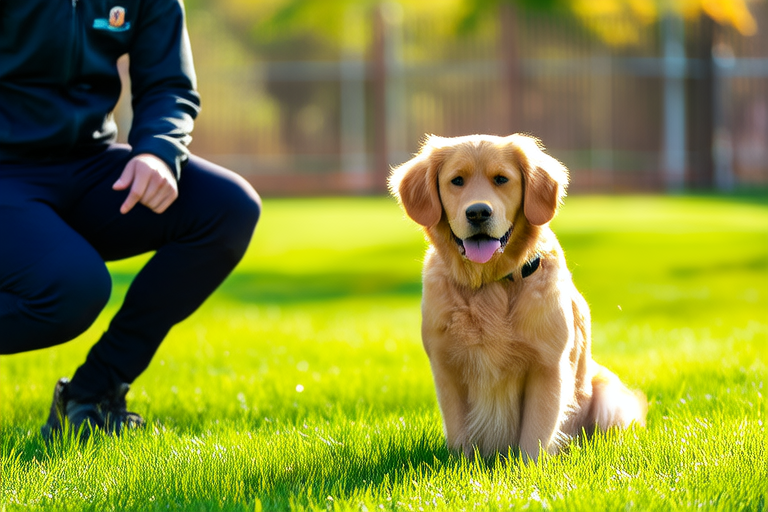Golden Retrievers Unleashed: Training Tips Every Pet Parent Needs
Golden Retrievers have long been cherished as one of the most popular dog breeds in the world. Known for their friendly and gentle demeanor, these dogs are often referred to as the ‘golden retriever standard’ for their loyalty and intelligence. Their adaptability makes them suitable companions for families, individuals, and even service roles. However, like any breed, proper training is essential to ensure that your Golden Retriever grows into a well-behaved, happy, and healthy member of your family. This article will guide you through various aspects of training your Golden Retriever, from basic obedience to managing behavioral issues.
Basic Obedience Training
Training your Golden Retriever starts with basic obedience commands. These commands form the foundation for more advanced training and help establish clear communication between you and your pet. Commands such as ‘sit’, ‘stay’, ‘come’, and ‘down’ are crucial. Begin by teaching ‘sit’. Hold a treat above your dog’s head and move it slightly backward. As your dog looks up, its bottom will naturally lower to the ground. Once they sit, reward them with praise and the treat. Consistency is key; practice this command several times a day until your dog responds reliably.
Another important command is ‘come.’ This can be challenging if not taught correctly. To teach ‘come,’ start in a quiet, distraction-free environment. Call your dog’s name followed by the command ‘come.’ When they approach, reward them with treats and affection. It’s crucial to never call your dog to punish them, as this can make them reluctant to come when called in the future.
Socialization Techniques
Socialization is vital for your Golden Retriever’s emotional and behavioral development. Exposing your puppy to various people, animals, environments, and experiences helps them grow into a confident and well-rounded adult. Start socializing your puppy as early as possible, ideally before they reach 16 weeks of age. Introduce them to different environments, including parks, pet stores, and other people’s homes. Encourage interaction with children and other pets under controlled conditions.
A real-life example of successful socialization involves a Golden Retriever named Max. Max was initially shy around strangers but his owner, Sarah, took him to dog-friendly cafes and parks regularly. Over time, Max became comfortable and friendly with new people and dogs, showcasing the benefits of consistent socialization efforts.
House-Training Methods
House-training is a critical aspect of raising a Golden Retriever. Patience and consistency are essential during this phase. Establish a routine by taking your puppy outside at regular intervals, especially after meals, naps, and playtimes. Choose a specific spot in your yard or a nearby park for potty breaks and always praise your dog when they eliminate in the correct location. Crate training can also be beneficial, as dogs naturally avoid soiling their sleeping areas. Place your puppy in a crate when you cannot supervise them directly, ensuring it is large enough for them to stand, turn around, and lie down comfortably.
For instance, Emily, who adopted a Golden Retriever puppy named Bella, used a combination of crate training and consistent outdoor trips. Bella quickly learned where she was supposed to go, and within a few weeks, accidents inside the home were rare.
Strategies for Managing Common Behavioral Issues
Like all dogs, Golden Retrievers may exhibit some behavioral issues. Barking, chewing, and jumping are common problems that can be addressed with appropriate training. For barking, identify the trigger and work on redirecting your dog’s attention. Teach them an alternative behavior, such as fetching a toy or sitting calmly. For chewing, provide plenty of appropriate chew toys and redirect your dog’s attention to these items whenever they attempt to chew on furniture or shoes.
Jumping can be managed by teaching your dog an alternative greeting behavior. When they jump, step back and ignore them until they calm down. Then, reward them for sitting politely. Remember, the goal is to replace unwanted behaviors with acceptable ones through positive reinforcement.
The Importance of Patience and Consistency
Patience and consistency are crucial in training your Golden Retriever. Training sessions should be short and frequent, lasting about 10-15 minutes at a time. Use positive reinforcement techniques, such as treats and praise, to encourage desired behaviors. Avoid harsh punishments, as they can lead to fear and aggression. Instead, focus on rewarding good behavior and ignoring or redirecting bad behavior.
Real-life success stories, like that of John and his Golden Retriever, Charlie, illustrate the power of positive reinforcement. John spent time every day training Charlie, praising him for sitting quietly and ignoring distractions. Over time, Charlie became a model citizen, rarely barking or misbehaving.
Maintaining a Strong Bond Through Positive Reinforcement and Continuous Learning
To maintain a strong bond with your Golden Retriever, continue to use positive reinforcement and engage in ongoing training. This not only strengthens your relationship but also keeps your dog mentally stimulated. Consider enrolling in advanced obedience classes or participating in activities like agility training or therapy work. These activities provide mental and physical stimulation, which is essential for your dog’s overall well-being.
Finally, remember that every dog is unique, and what works for one may not work for another. Be open to adjusting your training methods based on your dog’s individual needs and personality. By fostering a nurturing and encouraging environment, you can ensure that your Golden Retriever grows into a well-adjusted, loving companion.
In conclusion, training your Golden Retriever is both a rewarding and challenging endeavor. With patience, consistency, and positive reinforcement, you can help your furry friend develop into a well-behaved and loyal companion. Embrace the journey and enjoy the many joys that come with being a pet parent to a Golden Retriever.
